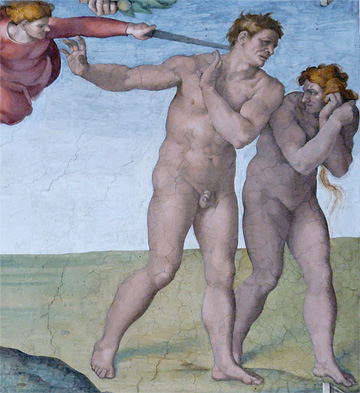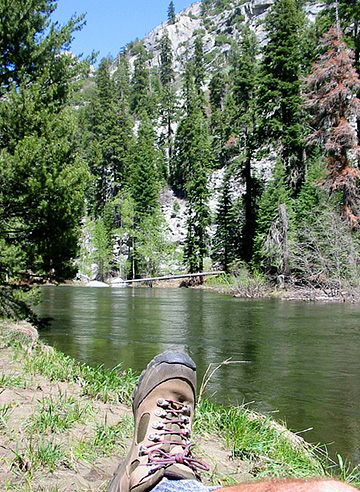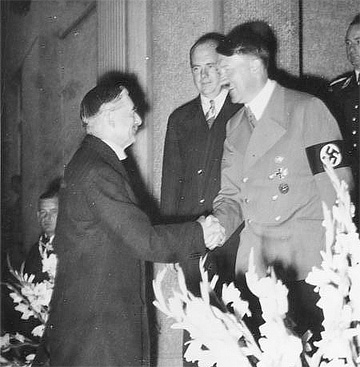I my last post I showed that peace, in biblical perspective, is closely related to the idea of paradise. God created the world as a place of peace: justice, harmony, fellowship. Through the end of Genesis 2, peace prevailed in God’s good creation.
Unfortunately, however, the story doesn’t end in Genesis 2. Even as my wife and I had to leave Paradise Valley eventually (see my last post), the first humans couldn’t remain in God’s perfect creation. Linda and I left voluntarily, however. Adam and Even were kicked out of their paradise. And, whereas Linda and I left our valley in its pristine state, Adam and Eve ruined everything, not only for themselves, but for the rest of us as well. In fact, they disrupted the peacefulness of God’s entire creation.
How did this terrible thing happen? When he was created, Adam was told by the Lord that he could enjoy the fruit of all the trees in paradise, save one. The fruit of the tree of the knowledge of good and evil he was to avoid completely (Gen 2:16-17). When the serpent enticed the woman to eat some of the forbidden fruit, she disobeyed God’s command and was joined by her husband in an illicit feast (Gen 3:6). All of sudden, peacefulness was shattered.
Immediately after they disobeyed God’s command, Adam and Even felt shame about being naked. They felt the need to hide from one another and from themselves. They no longer had peace between each other or even in their own souls (Gen 3:7). When God came to enjoy fellowship with them, they tried to hide from God as well (Gen 3:8). Sin had also destroyed human peace with God. (Photo: The Expulsion of Adam and Eve in the Sistine Chapel)
 Once God found the cowering couple, he explained the dire results of their actions. The intimate partnership God had designed for man and woman would be replaced with oppressive domination. The woman would fulfill God’s command to bear children, but only with intense pain (Gen 3:16). The man would also continue to till a garden, but now he would fight against thorns and thistles as creation itself turns against him. Whereas God intended humans to live forever in his peace, now they would die, both physically and spiritually (Gen 3:19). Finally, as the ultimate demonstration of what sin has destroyed, God banished Adam and Even from paradise. They could no longer enjoy the perfect, peaceful creation God had intended for them.
Once God found the cowering couple, he explained the dire results of their actions. The intimate partnership God had designed for man and woman would be replaced with oppressive domination. The woman would fulfill God’s command to bear children, but only with intense pain (Gen 3:16). The man would also continue to till a garden, but now he would fight against thorns and thistles as creation itself turns against him. Whereas God intended humans to live forever in his peace, now they would die, both physically and spiritually (Gen 3:19). Finally, as the ultimate demonstration of what sin has destroyed, God banished Adam and Even from paradise. They could no longer enjoy the perfect, peaceful creation God had intended for them.
The story of Adam and Even grips our hearts because it is not simply an ancient account of two people and their tragic mistake. It is our story as well. It is our personal tragedy. We share in this story both because Adam and Eve are our spiritual ancestors and because we mirror their behavior in our own lives. Like the first humans, we have rebelled against God. Thus we live outside of God’s paradise. We yearn for the peace for which we were created, but never experience that peace, except in bits and pieces. Though we were meant to live in peace with God, our neighbors, our world, and even ourselves, we experience brokenness in all of these relationships.
One of the things I find most attractive about Christianity is its realistic appraisal of human life. Some religious traditions minimize or even deny the reality of sin and its results. Suffering and evil are considered to be illusory. The Bible shows us, on the contrary, that these sorry states are all too real. God doesn’t try to sweep them under the rug of religious pretense, and neither should we. Thus when terrible things happen in our world, when terrorists murder innocent people, when tsunamis or hurricanes wipe out whole cities, when rich CEO’s steal from their hapless shareholders, Christians should not be surprised. Sad, yes; horrified, indeed; but not surprised.
Yet, at the same time, we must not fall pretty to cynicism or fatalism. Though we face the pain of this world head on, we don’t surrender to it. Unlike some philosophies and religions, we do not believe that suffering is essence of material existence. Beneath, the reality of suffering there is the goodness of God’s creation. That the bottom, there is God’s peace. As Christians, we live fully in this world, facing its brokenness head on, but not trapped forever within it. Though peace was truly destroyed in the fall of humankind, the Creator of peace remains. And he has a plan to reestablish peace throughout his creation. I’ll have more to say about this in my next post.
This post is part of a series: Seeking the Peace of Christ: Peacemaking and Christianity. You can read or link to the series by clicking on the series title.

